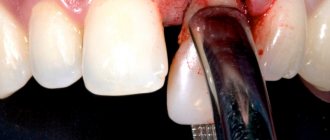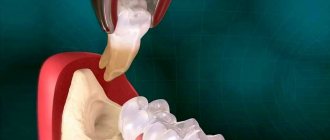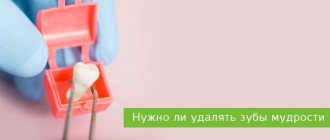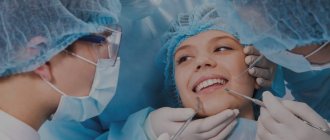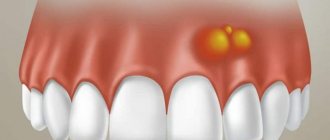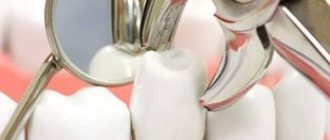26.11.2019
Many patients have itchy gums after tooth extraction. This is a dental problem, which is a fairly common consequence of surgery. The phenomenon occurs quite often in both adults and children. The operation can lead to other consequences, which will also be described in this article.
Correct oral care after tooth extraction
When dental problems arise, the dentist treating a person may recommend removing one or more affected teeth that cannot be restored. This operation is considered a minor surgical procedure. It is important to know not only how to properly prepare for it, but also what to do immediately after the operation. Of course, you can get more detailed recommendations from your doctor, but there are certain tips that will help the damaged gum heal faster and prevent gum scratching after tooth extraction.
Complications during tooth extraction
They occur rarely and may be associated with the actions of the surgeon and the condition of the dental system:
- damage to adjacent teeth or artificial crowns. The appearance of chips, fractures, other mechanical defects, weakening, loosening is possible. More often it occurs when working with molars, access to which can be complicated, due to crowding. Requires additional treatment;
- incomplete removal. After resection, a root fragment may remain in the bone. If the area is close to a nerve or there is a higher risk of additional injury, the dentist may leave it. Doctors at the DentoSpas clinic recommend atraumatic removal to prevent such situations from arising;
- removal of a section of the alveolar ridge. If the forceps were applied to the bone tissue surrounding the tooth, it can be removed along with it. This results in a serious bone defect. To remove it, plastic surgery is performed, protective membranes and bone tissue blocks are installed;
- jaw fracture. The risk of such a complication is increased with a weak jaw bone structure. Its changes may be associated with osteoporosis and other diseases.
Taking painkillers
If the doctor left a cotton-gauze swab in the tooth socket, then check exactly when it can be removed from the oral cavity. Thanks to this tampon, the wound heals faster. To get a positive result, you should not pull it out earlier than the dentist advises.
When the anesthetic drugs stop working, quite severe pain and discomfort may occur in the injured area of the oral cavity. Most dentists allow you to take painkillers, but you should check in advance which remedy will be most effective in your situation.
It must be remembered that even a simple tooth extraction is quite a lot of stress for the human body. That is why experts advise forgetting about strong physical activity at least for a few days. It’s better to rest a little these couple of days so that the body has time to recover from a stressful situation.
If the doctor does not give other advice, then you will be able to perform your usual regular oral hygiene within 24 hours after the operation. Remember that you need to brush your teeth carefully, especially in the place where the damaged hole is located and near it. Especially if your gums itch after tooth extraction. It is advisable to add socket rinsing to regular teeth cleaning and additionally use antiseptic agents. Rinsing and brushing teeth are allowed one day after surgery.
Proper oral care, especially after surgery, is very important. Bacteria or infections can enter an open wound, so it’s worth making sure they don’t have a chance.
If you notice that the gums are very swollen, suppuration has begun, or the wound is dry, the itching is too strong, then you should immediately seek advice from a specialist. The same should be done if severe pain occurs that does not go away after a long time after the operation.
What can the patient do after removal?
To help the wound heal, the patient must take steps to prevent secondary infection. To do this, immediately after the intervention you need to accurately follow the general recommendations of the dentist.
- Press the cotton swab placed in the hole firmly with your teeth. This is important to stop bleeding and blood clot formation.
- For the same reasons, you should not eat or drink for 3 hours.
- Once a clot has formed, it is necessary to exclude the possibility of injury and removal. Do not rinse your mouth vigorously, inspect the wound with your fingers or a toothpick, smoke, drink alcohol, hot foods and drinks, or solid foods.
- Visits to the fitness center, sauna, and beach should be excluded for several days. Physical activity and overheating can lead to complications.
Likely consequences
In addition to the fact that the gums may begin to itch after the removal of a wisdom tooth and other teeth, there is the possibility of other consequences of dental surgery. Even a minor surgical intervention has many features that must be taken into account. Initially, it is worth understanding why the gums itch after tooth extraction. Also an important topic for discussion are the factors that provoke the appearance of various disorders. Today, there are several main factors that provoke itching of the gums and other ailments after the removal of a diseased tooth.
Itching in the gums can occur due to poor-quality prosthetics
If removable dentures are installed, the cause of discomfort may be allergization of the body. This is due to the presence of a monomer in the prosthesis, which can cause an allergic reaction.
If your gums and teeth itch after fixing bridges and crowns, this may be due to galvanosis of the oral cavity. This may be due to the use of crowns made of a variety of metals. In such situations, both artificial boxes and removable structures must be urgently replaced.
Damage to the mucous membrane
If a person consumes a lot of very hot or cold food, spicy dishes, drinks, then various types of injuries, ulcers, and erosions can form in the oral cavity. This also occurs due to fairly intensive brushing of teeth or incorrect, very careless actions of the dentist who carried out the treatment. This occurs especially often after one or more teeth have been removed. The cause in this situation is damage to the gums, so the gums very often itch after tooth extraction during healing.
Classification
Depending on the nature of the healing of the hole, dentists distinguish several main forms of dental alveolitis:
- Serous. The initial stage of the disease usually appears 2–3 days after tooth extraction. This form is characterized by continuous pain that worsens while eating. Although the patient does not yet complain of feeling unwell, his lymph nodes are not enlarged, but he already feels that the disease is progressing.
- Purulent. If the serous form of alveolitis is not treated, the disease turns into a purulent form. Most often it is diagnosed 6–7 days after tooth extraction. The painful sensations can no longer be ignored, the pain intensifies, radiating to the ear or temple. Exploring the affected area also causes severe pain. Purulent alveolitis is characterized by a dirty gray coating inside the socket, significant swelling around the wound, thickened alveolar process and other problems. The patient's general health deteriorates significantly. Lymph nodes enlarge and become painful on palpation. Often the patient cannot even eat or open his mouth.
- Hypertrophic. At this stage, the symptoms of the disease subside. The patient notes a decrease in body temperature, improved well-being and decreased pain. However, at the hypertrophic stage, dangerous tissue proliferation occurs, which is clearly visible upon examination. When touched, pus is released from the inflamed area, and the mucous membrane acquires a bluish tint.
Ask a Question
Diseases of an inflammatory or infectious nature
This group of reasons includes the development of dental pathologies such as gingivitis, stomatitis, periodontitis, and candidiasis. Diseases occur due to the rapid proliferation of pathogenic microflora of various types. Also, a factor that provokes the appearance of pathology may be improper oral care.
Quite often you may encounter the fact that along with the development of an inflammatory or infectious disease, bleeding appears, the gums become very sensitive to various irritants, and a very unpleasant odor appears from the mouth. For this reason, the gums may itch after tooth extraction.
When do you need specialist help?
You should contact your dentist even if you have minor discomfort in your mouth. It is easier to cure any disease at an early stage of development. The help of a specialist is necessary if itching in the gums is accompanied by:
- bleeding,
- unpleasant smell,
- redness of soft tissues,
- erosions and suppuration,
- pain of different localization.
These symptoms indicate serious problems that require medical or surgical treatment.
Leukoplakia
This disease is characterized by a special condition, which, as a rule, appears immediately before the development of oncology. In this case, leukoplakia can manifest itself not only as very severe itching in the gum area. Other symptoms also occur: a feeling of numbness, white spots and a dense coating form on the affected area of the gums or oral cavity. Almost all patients suffering from leukoplakia complain about this. In most cases, the disease affects people who have a long history of smoking and smoke more than a pack of cigarettes per day.
Inflammatory processes in the gum area - another reason to think
One of the main causes of itchy gums in adults is associated with chronic gingivitis. As a result, the patient may experience the following adverse events:
- Bad breath;
- Bleeding occurs during hygiene procedures;
- The appearance of redness and swelling in the gum area;
- Cyanosis.
If itching in the teeth and gums is a consequence of periodontitis, then in addition to the above symptoms, the following may occur:
- Exposure of tooth roots;
- Discharge of pus from periodontal pockets;
- The appearance of mobility of dental units.
Itchy gums with periodontitis and gingivitis. What to do?
Initially, you need to contact an experienced periodontist. Since inflammatory processes in the gum area are caused by poor oral hygiene, which results in the appearance of various deposits on the surface of the teeth and gums. This allows you to get a clear answer to the question: “Why do my gums itch, hurt and bleed?”
This means that the main treatment procedures will be aimed at removing plaque and deposits from the surface of the teeth. Subsequently, therapy is prescribed, including the use of anti-inflammatory drugs (rinsing with antiseptic solutions, gel applications, etc.). That is, if itching of the gums occurs in adults, first of all you need to eliminate the causes, and only then begin treatment. Otherwise, anti-inflammatory measures will be ineffective.
Allergic reaction
The most common cause of itching of the gums after tooth extraction and discomfort in the oral cavity can be called a direct allergic reaction. It can occur not only due to medications that were used during tooth extraction, but also due to food products, stabilizers, preservatives, and dyes that they contain. Sometimes allergies occur due to improperly selected hygiene products or household chemicals that somehow got onto the oral mucosa.
Why does the tooth under a filling itch?
After applying the filling material, individual intolerance sometimes occurs. In addition, allergic reactions appear, expressed by redness, swelling, and itching. If the symptom does not go away or gets worse, it is important to see a dentist as soon as possible.
When dental treatment is not performed correctly (for example, not all of the carious area is removed), over time the affected tissues begin to rot and decompose, causing infection. If discomfort appears, a complete replacement of the filling is indicated. If pathogenic microorganisms have managed to penetrate the pulp by this time, you cannot avoid depulpation.
Itchy gums after tooth extraction: how to treat
The gums can itch for a variety of reasons; therefore, today there is no single treatment regimen approved by dentists.
Initially, you need to remove all those factors that can provoke the development of a particular pathology. Also visit the dentist to eliminate plaque, sources that injure the gums and mucous membrane of the oral cavity, foci of inflammation or infection. To eliminate itching of the gums, you can use antihistamines, antibiotics, and oral disinfectants. Before starting use, you should definitely consult with your dentist so that he can select the most suitable means, having previously established the causes of such a problem as itching of the gums after tooth extraction. Category: Tooth extraction Published by Mister stomatolog
Allergy - itchy gums
If a person says that his gums are very itchy, this is not always evidence of a serious illness. A similar process can occur when taking any food products (chocolate, dyes, citrus fruits, spices, honey, etc.), or as a side effect when using toothpaste. In this case, it is better to stop consuming allergens or replace the toothpaste.
Often, an adult's gums itch when taking certain medications in contact with the mucous membrane. This is due to the rapid entry of mediators and allergens into the blood.
Depulpation before prosthetic crowns
Depulpation is unconditional if there is serious tooth decay. It is preferable to remove the dental nerve during prosthetics in the following cases:
- The size of the teeth determines the low position of the crown (too small or short teeth);
- The inclination of the prosthetic tooth is from 15°;
- Increased sensitivity of teeth;
- According to aesthetic requirements.
The need to remove the dental nerve during prosthetics is dictated by deep removal of the top layer of dental tissue: if the doctor is not sufficiently qualified, heating or touching the nerve can cause an attack of unbearable pain. However, cases of nerve-sparing crown installation also occur in modern dental practice.
If over time the nerve under the crown becomes bothersome, it is possible to remove the pulp through the top of the crown and fill the hole after removal.
The danger of such a procedure is associated with the risk of complications in the future due to surgery on the exposed dental nerve.
What not to do
In order to avoid any complications after surgery to remove any tooth, you must follow the following rules:
- Do not eat or drink anything for 3 hours after surgery;
- It is not recommended to eat hot, spicy, hard and fine-grained foods, or drink hot drinks. The load when chewing food must be transferred to the healthy side of the jaw;
- For 3 days, limit physical activity and procedures that increase blood pressure or increase blood flow. Do not take hot baths. Bathhouse, sauna, solarium, visiting the beach are prohibited;
- Do not touch the hole with your tongue, finger, toothbrush, or toothpick;
- Do not rinse your mouth;
- Do not ignore the advice, recommendations and prescriptions of the dentist. Do not violate your medication schedule.
If the patient has any doubts about his condition or questions for the doctor, he should not put off calling the clinic “for later.”
When nerve removal is indispensable
In modern dental practice, both complete and partial resection are used. Indications for the procedure:
- deep carious tissue damage;
- chronic pulpitis (including asymptomatic);
- bactericidal infection spread by the apex of the tooth root;
- the presence of an extensive pulp area, the threat of developing periodontitis or transition to periodontitis;
- trauma leading to nerve exposure and tooth destruction;
- the need to correct a medical error;
- the need for prosthetics with low crowns.
Unbearable pain can also be an indication for depulpation.
The dentist will never prescribe such a serious intervention as long as it is possible to save the tooth.
Important : problematic “eights” when affected by caries, as a rule, are removed. This is due to the location of the “wisdom” teeth at the end of the dentition, which makes cleaning them from plaque and stone and filling the canals very problematic. Indications for removal are also the wrong direction of eruption, displacement of the dentition, malocclusion, and the development of pulpitis.
